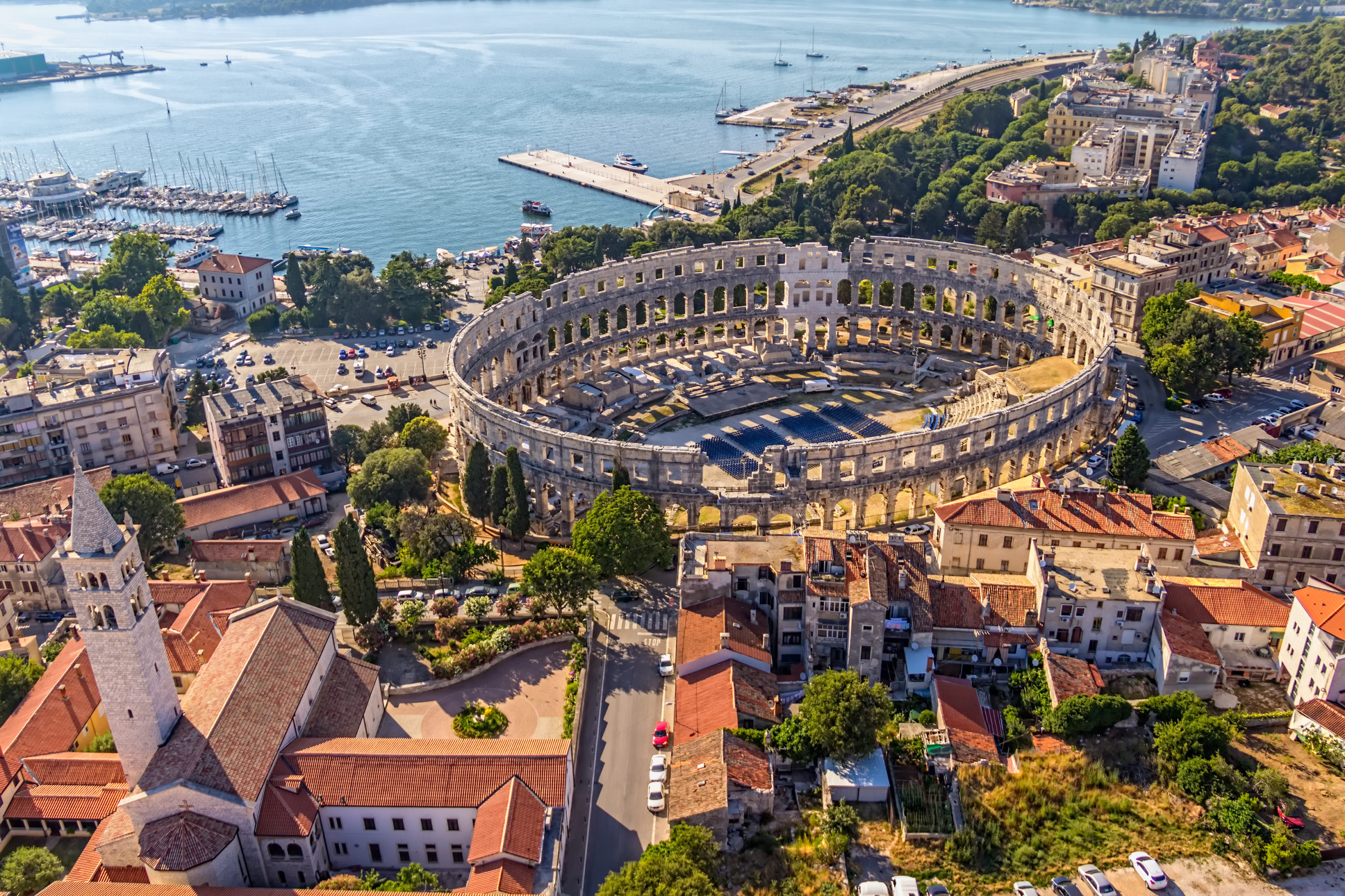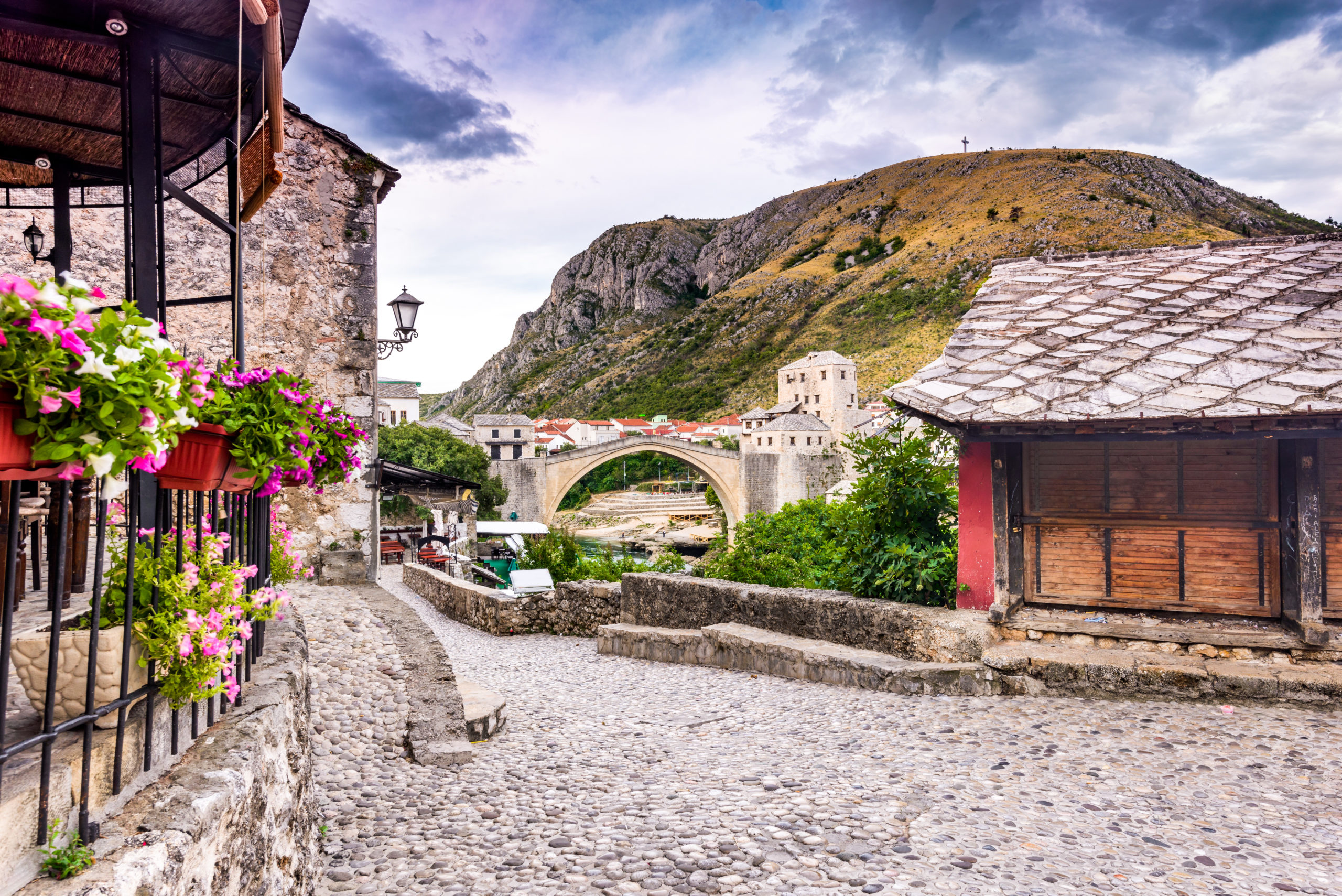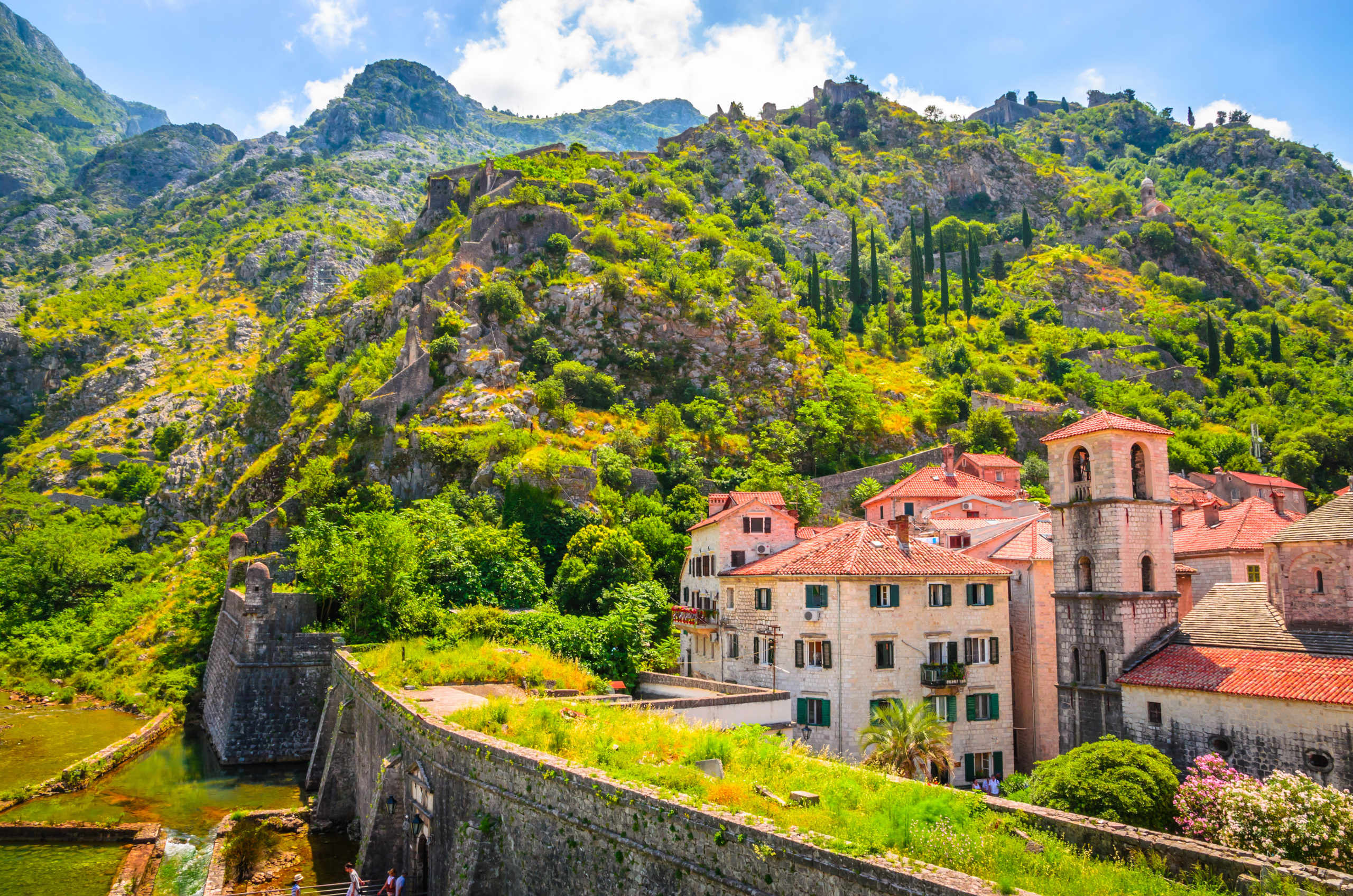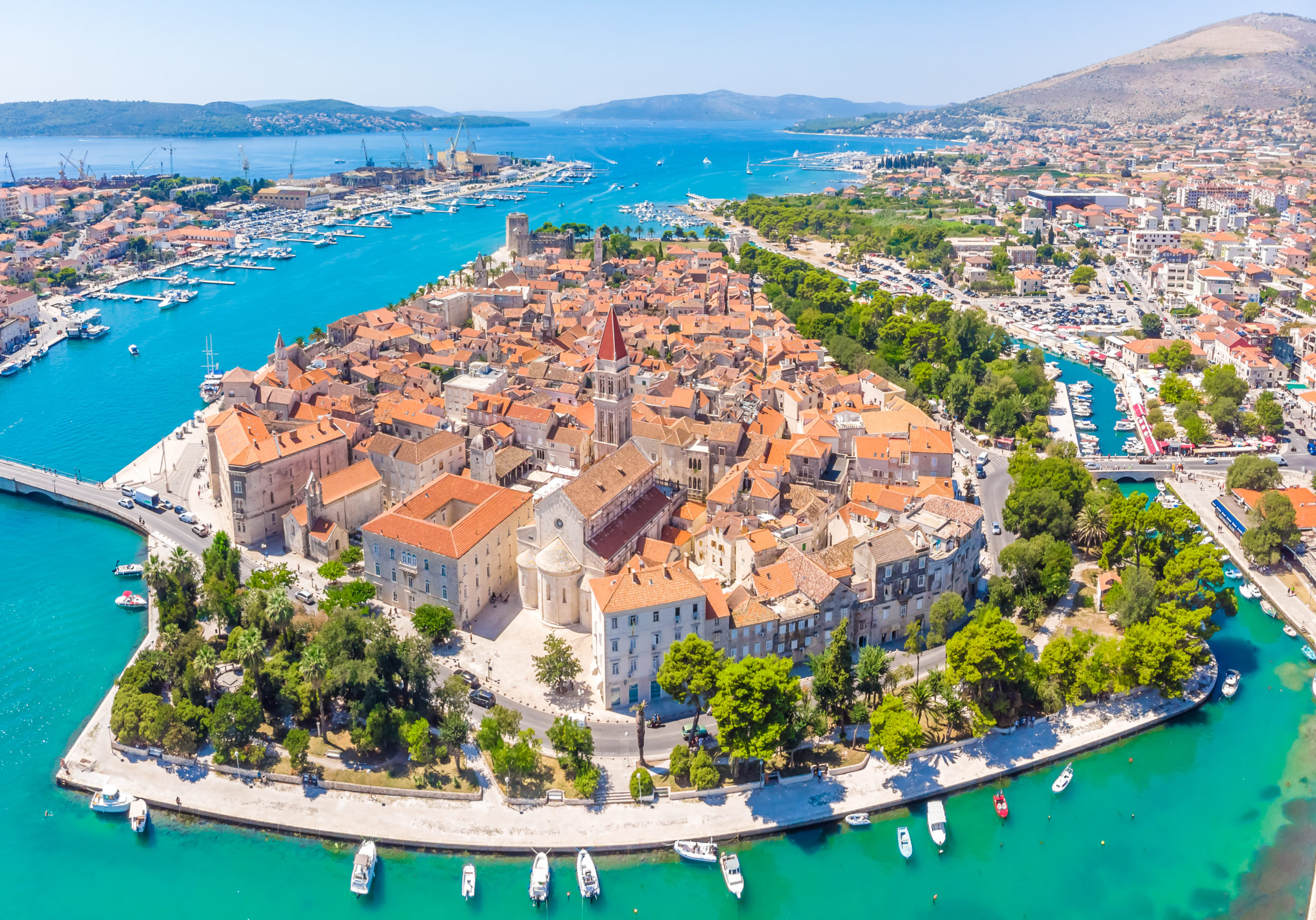Strategic Analysis Balkan Brief
First half of March 2023
Petra Bošková, Lýdia Chobotová, Sára Gregová, Natália Lešňovská, Adam Németh, Barbora Tomanová, Victoria Valová, Tibor Čech, Marianna Dobisová

Roman time arena in Pula, Croatia. Photo: OPIS Zagred/Shutterstock.com
Albania
Albania – Deepening Divisions in Albania’s Main Opposition Party
On March 6, conflict in the center-right Democratic Party erupted when the then-party leader Lulzim Basha expelled Sali Berisha, Albania’s former president, from the party’s parliamentary group. Grounds for Basha’s action were the US findings of Berisha’s alleged involvement in “significant corruption”, “misappropriation of public funds”, and interference in “public processes”. As a result, the US proclaimed him “persona non-grata” and imposed sanctions.
After the expulsion, Berisha attacked Basha’s leadership and held a large-scale assembly where a new party statute was adopted.
As the opposing groups were unable to come to an agreement over who would lead the main opposition party in Albania, the only option to resolve the conflict was through a court ruling.
In the meantime, defeat in local by-elections led Basha to resign and delegate his competencies to Enkelejd Alibeaj. After the court recognised the decisions of Berisha’s Assembly, Alibeaj appealed the court ruling.
Alibeaj’s appeal for a retrial in the protracted leadership feud inside the main opposition party has been granted by Tirana’s Court of Appeals. Berisha condemned the decision and blamed socialist Prime Minister Edi Rama for having been involved in the ruling.
The two rival factions of the Democratic Party both submitted their applications for the local elections scheduled for May 14, 2023, to the Central Elections Commission (CEC) after the Court of Appeals of Albania failed to resolve the leadership dispute within the main opposition party. This denotes that the rival groups will run their own candidates in the upcoming elections, leading to a further deepening of the within-party division.
Political analyst and head of the Institute for Political Studies, Afrim Krasniqi, proclaimed that the opposition has fallen short of its objectives, as it should ‘keep the government under monitoring and offer a constructive alternative, in order to win a majority in the next elections’. This will not be accomplished as ‘having two candidates in the race means a fight for second place’ says political journalist Lutfi Dervishi.
While elections should offer alternatives and bring about change in a country tired of corruption and scandals, the weak and fragmented opposition fails to do so.
Sources:
- Fjori Sinoruka, Balkan Insight, “Court Ruling Further Complicates Albania Opposition Leadership Battle”, https://balkaninsight.com/2023/03/06/court-ruling-further-complicates-albania-opposition-leadership-battle/
- Fjori Sinoruka, Balkan Insight, “Tirana Court Rules Retrial In Main Opposition Partys leadership battle”,https://balkaninsight.com/2023/03/03/tirana-court-rules-retrial-in-main-opposition-partys-leadership-battle/
- Alice Taylor, Euractiv, “New Ghosts of Albanian Opposition Partys Former Leader Appears Before Local Elections”, https://www.euractiv.com/section/politics/news/ghost-of-albanian-opposition-partys-former-leader-appears-before-local-elections/
Bosnia and Herzegovina
Dodik’s action of not signing a new law
On March 2, Milorad Dodik – President of the Republika Srpska, has refused to sign the law that would enable visa-free travel for citizens of Kosovo to Bosnia and Hercegovina and vice-versa. This was supposed to be an outcome of the Berlin process, an initiative led by Germany that is supposed to stimulate more regional cooperation between 6 Western Balkan countries. It was the next step from an agreement that had been signed by the countries in Berlin with regard to cross-border controls using only ID cards.
Being signed on behalf of prime minister Zoran Tegeltija, former chair of the Bosnian Council of Ministers, the country’s executive government, and a member of Dodik’s Alliance of Independent Social Democrats, SNSD. At the same time, the document was ratified by Kosovo in the middle of February, and this gave hope that the dispute would be settled soon. However, it was not, and Dodik’s refused to sign the deal, citing that: „We will all think about it when my fellow Serbs can also enjoy basic rights in Kosovo and Metohija when the interim authorities in Prishtina implement everything that was signed under the supervision of the EU”.
If the new law were signed, it would be the last visa problem that is undergoing in the region. Kosovo has imposed a visa obligation for citizens from BIH to enter the country since 2014 in reaction to the fact that citizens of Kosovo travelling to BIH have had to have visas since Kosovo’s independence in 2008. Not putting this law in force just creates tension between Republika Srpska and Kosovo, and at the same time, it shows the vulnerability of the system in BIH and its unusable political system. Postponing these kinds of agreements that should enhance regional cooperation and prepare the countries to slowly integrate just postpones their ability and their readiness to enter the EU.
Sources:
- Kurtic Azem, Balkan Insight, „Bosnian Serb Leader Blocks Regional Kosovo ID Travel Deal“, https://balkaninsight.com/2023/03/02/bosnian-serb-leader-blocks-regional-kosovo-id-travel-deal/.

Mostar, Bosnia and Herzegovina. Photo: ecstk22/Shutterstock.com
Croatia
The link between Serbian and Croatian right-wing academics
Some peculiar ties between Serbian and Croatian right-wing academics were brought to light when two historians from the Belgrade Institute for Contemporary History spoke in Zagreb about the Serbian nationalist Chetnik movement during World War II.
The two historians discussed the agony faced by the Chetnik troops led by Dragoljub “Draza” Mihailovic as they fled across Bosnia at the close of World War II when the Communist-led Partisans freed Yugoslavia from Nazi Germany and its local allies but avoiding highlighting the crimes they perpetrated. The controversy that brought the attention of media and journalists was the presence of the ex-culture minister of Croatia, who is currently a member of parliament representing a nationalist party Bloc for Croatia – Zlatko Hasanbegović. Hasanbegovic’s presence not only attracted media attention but also infuriated the right-wing Homeland Movement party, which collaborates with the Bloc for Croatia in the parliament, which now demands that Hasanbegovic should apologise for attending this lecture.
The Serbian historians have been charged with historical revisionism and trying to revive the Chetnik movement. Although such concepts are common in Serbia, they had never been officially presented at a major institution in the Croatian capital before last week. The Croatian Institute of History, which organised the lecture, has also been criticised in the past for seeing historical events from a right-wing perspective. Croatian historian Goldstein who is a professor at Zagreb University claimed that certain individuals at the Croatian Institute of History similarly downplay the atrocities done at the Jasenovac prison during World War II, which was managed by the Ustasa movement during the administration of the Independent State of Croatia, NDH, which was associated with the Nazis. He adds: “The Chetniks were a criminal organisation that committed mass crimes in [the town of] Fojnica [in Bosnia] during the last months of the war, and now to declare them victims of the Partisans, who were a liberating force, is a complete reversal of events.”
Professor Klasic from Zagreb University notes that historical revisionism on the subject of World War II has been a consistent factor in Croatia and that historical revisionism shares some ideas in Serbia and Croatia. The unifying element of both Serbian and Croatian nationalists and revisionists is anti-communism.
Sources:
- Tesija Vuk, Balkan Insight, “Chetnik Controversy Highlights Links Between Serbian and Croatian Right” https://balkaninsight.com/2023/03/03/chetnik-controversy-highlights-links-between-serbian-and-croatian-right/
Kosovo
More Details Revealed about Hashim Thaci’s Upcoming War Crimes Court Case
The long-anticipated case with the former Kosovo President Hashim Thaçi is to begin in early April at the Kosovo Specialists Chambers court in the Hague. Along with his three former Kosovo Liberation Army (KLA) fighters, Thaçi is facing trial on war crimes and crimes against humanity.
Thaçi, the first Prime Minister of independent Kosovo who, resigned from his office as President in 2020 after the charges leading to the current trial were brought against him. As the beginning of the trial is nearing after the pre-trial phase was closed last November, more details are coming up regarding the charges.
The alleged crimes were executed roughly between March 1998 and September 1999, with all four men who have been detained since November 2020 rejecting the accusations. The prosecutors have now partially published a huge amount of evidence, including the names of some victims of the supposed crimes linked to Thaçi.
Although the four men are not accused of being directly responsible for some of the crimes, the prosecutors claim that they bear criminal responsibility due to their high command positions in KLA for almost 100 murders.
The gathered files state that the accused men “by means including unlawfully intimidating, mistreating, committing violence against, and removing those deemed to be opponents” tried to establish control over Kosovo and break free from Yugoslavia.
On multiple events, the four men were allegedly arresting, detaining, interrogating, beating, and in some cases even executing predominantly ethnic Serbs, but also ethnic Albanians who did not actively support KLA.
The published information hints that evidence from specific mass graves as well as cases of forced disappearances will also come up during the trial. Despite having their seat in the Hague and being composed of international judges, the Specialist Chambers form a part of the Kosovar judicial system.
The Kosovar parliament established the Chambers in 2015 in response to pressure from its Western allies, who were doubting whether the Kosovar justice system was capable of handling cases related to KLA while safeguarding witnesses from intimidation.
What comes as no surprise is that in Kosovo, this so-called “Special Court” is deemed to be unfairly targeting former KLA members rather than the Serbian perpetrators of the majority of the war crimes from the years 1998 and 1999 that took place in Kosovo.
Sources:
-
Xhorxhina Bami, Balkan Insight, „Hague Court Publishes Details of Hashim Thacis Alleged“,https://balkaninsight.com/2023/03/02/hague-court-publishes-details-of-hashim-thacis-alleged -war-crimes/
-
Serbeze Haxhiaj, Balkan Insight, „Kosovo Special War Court Delivers First Convictions For Guerillas“, https://balkaninsight.com/2022/12/23/kosovo-special-war-court-delivers-first-convictions-for-guerrillas/
Montenegro

Old town Kotor, Montenegro. Photo: Olena Znak /Shutterstock.com
Montenegro starts unblocking Constitutional Court
On February 27, Montenegro’s parliament appointed three new Constitutional Court judges, unblocking the country’s top court. The Constitutional Court has been without a quorum since September last year because main political figures failed to agree on new members. Podgorica’s highest legal instance has seven judges, but four places have been vacant since September.
Parliament members approved three out of four judges. They failed to agree on the fourth candidate. However, the court is formally unblocked despite lacking one member. The parliamentary majority and the opposition agreed on the election of three candidates, Dragana Djuranovic, Snezana Armenko and Momirka Tesic. They were backed by 77 parliament members in the 81-seat parliament. A fourth candidate, Faruk Resulbegovic, did not win the support because the minority parties failed to agree on a joint candidate. The Country’s Bosniak party and Albanian coalitions could not agree on a joint candidate because Resulbegovic is Albanian. Bosniak party wanted to elect a Bosniak judge Alija Beganovic.
Parliament will hold a second-round vote on the fourth candidate in a month’s time at the earliest. According to Montenegro’s constitution, judges need the support of a two-thirds majority of MPs, or 54, with the bar falling to 48 MPs in a second-round vote.
Unblocking the Constitutional Court was a necessity for Montenegro’s full political functioning because it is the highest legal instance for appeals on electoral irregularities. For instance, due to the lack of quorum in the court, after the local elections last autumn, final electoral results could not be confirmed in six towns, including Podgorica. Moreover, the stalemate has threatened to halt Montenegro’s European Union membership bid. EU’s institutions and officials have warned Podgorica that normal functioning of the judiciary is a must if it wants to continue on its path to joining the EU.
Nevertheless, civic organisations are not satisfied with the election of judges. They are concerned that the court could be under political pressure because of the political links between newly elected judges and political parties. Dragana Djuranovic has been a member of the DPS since 2017, however, parliament claims that she left the DPS before her appointment. According to the media, Momirka Tesic is close to the ruling party, Democratic Montenegro and Snezana Armenko has the support of the ruling Democratic Front. Both Tesic and Armenko denied those claims.
Sources:
- Samir Kajosevic, Balkan Insight, „Montenegro Starts Unblocking Constitutional Court, Electing New Judges“ https://balkaninsight.com/2023/02/27/montenegro-starts-unblocking-constitutional-court-electing-new-judges/
- European Western Balkans, „Montenegro’s Constitutional Court unblocked“ https://europeanwesternbalkans.com/2023/02/28/montenegros-constitutional-court-unblocked/
- Predrag Milic, AP News, „Montenegro ends court stalemate that has threatened EU bid“ https://apnews.com/article/politics-european-union-europe-montenegro-business-dd479555d9a2ea2073d693c1bd146abe
The opposition in Montenegro criticises the ambassador for calling the election violence “fascist“.
On March 13, after French Ambassador Christian Thimonier described the attack on presidential candidate Jakov Milatović as an instance of “fascist aggression,” opposition parties criticised him.
The attack on presidential candidate Jakov Milatović in Cetinje on March 13 was described by French ambassador Christian Thimonier as a “fascist aggression against European ideals,” which drew criticism from the opposition parties in Montenegro on Monday.
On Sunday, Thimonier told the daily Vijesti: “This kind of fascist aggression is against not only European values but also basic human values. Attention should be paid at all levels in all parties to prevent hate speech that opens up space for such unacceptable behaviour.”
He spoke out after Milatović was attacked by pro-Montenegrin demonstrators on Friday in Cetinje in an effort to keep him from attending an election convention in the former capital. Eight people were questioned by police in relation to the candidate’s attack.
The state President’s office and the mayor of Cetinje, Nikola Djurašković, both protested the ambassador’s remarks and claimed they insulted Cetinje’s residents. The Social Democrats, Liberal Party, and pro-Montenegrin Social Democratic Party urged Thimonier to exercise more restraint in his public pronouncements.
“With these comments, Thimonier went beyond the framework of generally accepted diplomatic rhetoric. In any country, this kind of impropriate comments would put the ambassador in an unenviable position, or he would be interviewed by the Ministry of Foreign Affairs of the host country,” the opposition Democratic Party of Socialists MP Andrija Nikolić said on March 13.
Montenegro will hold presidential elections on March 19, with Milo Djukanović, the current president, among the seven contenders.
Sources:
- Kajosevic, Samir, Balkan Insight, „Montenegro Opposition Criticises Ambassador’s Condemnation of “Fascist” Election Violence“ https://balkaninsight.com/2023/03/13/montenegro-opposition-criticises-ambassadors-condemnation-of-fascist-election-violence/

Trogir, Croatia. Photo: OPIS Zagreb/ Shutterstock. com
Serbia
Serbian displeasure with normalisation talks with Kosovo
On February 27, claims about a verbal agreement between Kosovo and Serbia on the normalisation of relations surfaced. Both countries have apparently agreed to sign an 11-point plan proposed by the EU. The plan includes points on good-neighbourly relations with each other, mutual recognition of documents and national symbols, guarantees of self-management for Kosovo Serbs, and most importantly, neither of the two countries can represent the other in the international community, meaning Serbia cannot veto Kosovo´s membership in any international organisation.
Shortly after the news broke, dissatisfaction with the plan itself and the verbal agreement came from both Kosovo and Serbia. Serbian opposition parties criticised that the Government of Serbia had essentially agreed to accept the independence of Kosovo, and President Vučić was accused of “betraying” Serbia and Serbs in Kosovo. In the next few days, on multiple occasions, Vučić backtracked on the claims of the alleged verbal agreement and stated, “we cannot talk about mutual recognition and the entry of Kosovo into the UN” and expressed that he intends to keep “Kosovo and Metohija as part of Serbia”.
Moreover, Vučić said that Serbia is willing to continue the negotiations and compromise, however, for Serbia, the creation and implementation of the Association of Serb-Majority Municipalities in Kosovo is a must-have and number one priority in the negotiations.
On March 10, Vučić spoke in front of the media and expressed doubts about the upcoming EU-facilitated dialogue with Kosovo about the 11-point plan that will be held on March 18. He said, “I have no intention of signing Serbia’s capitulation. … There will be no surrender, no capitulation. I have undoubtedly made it clear that Serbia will not agree to Kosovo joining NATO, nor will we recognise Kosovo in any way.” Moreover, he accused Kosovo and the Kosovo PM Kurti of unwillingness to make any compromise. He doubted that Kosovo would agree to implement the Association of Serb-Majority Municipalities at any point.
Sources:
- Sasa Dragojlo, Balkan Insight, “Serbia Rules Out Signing EU Plan Over Kosovo’s UN Membership”, https://balkaninsight.com/2023/03/01/serbia-rules-out-signing-eu-plan-over-kosovos-un-membership/
- Perparim Isufi & Sasa Dragojlo, Balkan Insight, “Opposition Parties Criticise Kosovo, Serbia Agreement on Normalisation Plan”, https://balkaninsight.com/2023/02/28/opposition-parties-criticise-kosovo-serbia-agreement-on-normalisation-plan/
- Bojana Zimonjić Jelisavac, EURACTIV, “Serbia gives definite ‘no’ to Kosovo recognition, NATO accession”, https://www.euractiv.com/section/politics/news/serbia-gives-definite-no-to-kosovo-recognition-nato-accession/
North Macedonia
Bakeries against the governmental decision to freeze the prices of bread
On March 3, several bakeries stopped the production and delivery of white and semi-white bread to supermarkets. The reason was a protest against a government measure that froze the price of bread (weighing 450 grams) at 33 denars per loaf. The main objective of this government measure was to prevent further food price increases.
This measure was preceded by another government measure in the form of an electricity subsidy for bread producers with the same aim of bringing down the price of the product. However, the price of bread did not fall despite the state aid, so the government resorted to the more severe measure of freezing the price of bread.
Due to the disapproval and protest of the bread producers and the Members of the Association of Bakeries, the supply of bread to the shops has been stopped. The worst situation was in Skopje.
The Minister of Agriculture, Nikolovski, was very critical towards the bakeries, saying that “we cannot allow someone to increase profits on account of the citizens and the well-being. The government provided subsidies for energy so that the bakeries reduce the prices of bread, but they failed to comply, hence the decision for the frozen prices. The government must think about the people above all.” A very similar view was expressed by Prime Minister, Kovachevski.
The bakers, on the other hand, defended themselves on the grounds that such a measure was causing them huge financial losses. However, they were prepared to negotiate with the government.
On Saturday, March 4, the bakers decided to distribute white and semi-white bread once again at a set price, but they have also decided to sue the state and take legal action to recover the losses that they will eventually suffer because of this government decision.
Despite the problems caused by the shortage, the government also wants to go ahead with price freezes on other products.
Sources:
- Silvana Kocovska, Media Information Agency, “Bakers to start delivering bread at Mden 33 from Saturday, to launch legal fight with Gov’t“, https://mia.mk/en/story/bakers-to-start-delivering-bread-at-mden-33-from-saturday-to-launch-legal-fight-with-govt?fbclid=IwAR1K1q6WyoKuFMH0T4OKR9R7h2bCNZFWu44ikn21w4zkKy2Gfof8pq24Gu8
- Marija Kizova, Opserver.mk, „Одлуката на пекарите останува во сила, и денеска нема да испорачуваат леб“, https://opserver.mk/makedonija/odlukata-na-pekarite-ostanuva-vo-sila-i-deneska-nema-da-isporachuvaat-leb/

Contact us